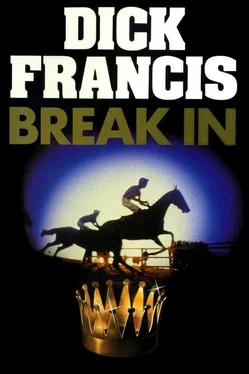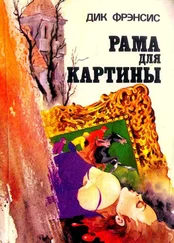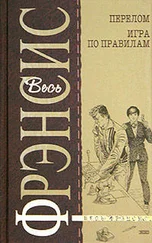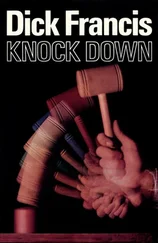‘I’m all right,’ I said though, because it was true where it counted, and we went safely down to the bottom.
I stopped there. The exit door stood open ahead, a passage stretching away indoors to the right.
‘Come along,’ Pollgate said, gesturing to the door. ‘If we’re going, let’s go.’
‘My anorak,’ I said, ‘is in the cloakroom.’ I produced the ticket from my pocket. ‘Anorak,’ I said.
‘I’ll get it,’ Lord Vaughnley said, taking the ticket. ‘And I’ll see Mario. Wait for me in the car.’
It was a large car. Jay Erskine was driving. Nestor Pollgate sat watchfully beside me on the back seat, and Lord Vaughnley, when he returned, sat in the front.
‘Your anorak,’ he said, holding it out, and I thanked him and put it by my feet, on the floor.
‘The films of the races have just ended, Mario says,’ he reported to Pollgate. ‘He’s going straight in to make our apologies. It’s all settled. Off we go.’
It took ages to get out of London, partly because of thick traffic, mostly because Jay Erskine was a rotten driver, all impatience and heavy on the brakes. An hour and a half to Newmarket, at that rate: and I would have to be better by then.
No one spoke much. Jay Erskine locked all the doors centrally and Nestor Pollgate put the stun gun in its case in his right-hand jacket pocket, hidden but available; and I sat beside him in ambiguity, half prisoner, half ringmaster, going willingly but under threat, waiting for energy to return, physical, mental and psychic.
Stun guns, I thought. I’d heard of them, never seen one before. Used originally by American police to subdue dangerous violent criminals without shooting them. Instantaneous. Effective. You don’t say.
I remembered from long-ago physics lessons that if you squeezed piezo-electric crystals you got sparks, as in the flickering lighters used for gas cookers. Maybe stun guns were like that, multiplied. Maybe not. Maybe I would ask someone. Maybe not. Five thousand volts...
I looked with speculation at the back of Lord Vaughnley’s head, wondering what he was thinking. He was eager, that was for sure. They had agreed to the journey like thirsty men in a drought. They were going without knowing for sure why, without demanding to be told. Anything that could do Maynard Allardeck harm must be worth doing, in their eyes: that had to be why, at the beginning, Lord Vaughnley had been happy enough to introduce me to Rose Quince, to let me loose on the files. The destruction of Maynard’s credibility could only be helped along, he might have thought, by pinpricks from myself.
I dozed, woke with a start, found Pollgate’s face turned my way, his eyes watching. He was looking, if anything, puzzled.
In my rag-doll state I could think of nothing useful to say, so I didn’t, and presently he turned his head away and looked out of the window, and I still felt very conscious of his force, his ruthlessness, and of the ruin he could make of my life if I got the next few hours wrong.
I thought of how they had set their trap in the Guineas.
Icefall’s sponsors, on my answering machine, inviting me to lunch. The sponsors hadn’t said where, but they’d said tomorrow, Tuesday: today. The message would have been overheard and despatched to Pollgate, and sent from him to Lord Vaughnley, who would have said, Nothing simpler, my dear fellow, I’ll join forces with those sponsors, which they can hardly refuse, and Kit Fielding will definitely come, he’d do anything to please the princess...
Pollgate had known the Guineas. Known Mario. Known he could get an isolated room for an hour. The sort of place he would know, for sure.
Maybe Lord Vaughnley had suggested the Guineas to Icefall’s sponsors. Maybe he hadn’t had to. There were often racing celebration parties at the Guineas. The sponsors would very likely have chosen it themselves, knowing they could show the films there.
Unprofitable thoughts. However it had been planned, it had worked.
I thought also about the alliance between Lord Vaughnley and Nestor Pollgate, owners of snapping rival newspapers, always at each other’s throats in print, and acting in private accord.
Allies, not friends. They didn’t move comfortably around each other, as friends did.
On 1 October Lord Vaughnley had signed the charity letter recommending Maynard for a knighthood: signed it casually perhaps, not knowing him well.
Then later in October his son Hugh had confessed to his dealings with Maynard, and Lord Vaughnley, outraged, had sought to unzip Maynard’s accolade by getting Pollgate and his Flag to do the demolition; because it was the Flag’s sort of thing... and Jay Erskine, who had worked for Lord Vaughnley once, was in place there in the Flag, and was known not to be averse to an illegal sortie, now and then.
I didn’t know why Lord Vaughnley should have gone to Pollgate, should have expected him to help. Somewhere between them there was a reason. I didn’t suppose I would get an answer, if I asked.
Lord Vaughnley, I thought, could have been expected to tell the charity he wanted to recant his approval of Maynard Allardeck’s knighthood: but they might have said too bad, your son was a fool, but Allardeck definitely helped him. Lord Vaughnley might as a newspaperman have seen a few destructive paragraphs as more certain, and more revengefully satisfying, besides.
Before that, though, I guessed it had been he who had gone to the producers of How’s Trade, who said dig up what you can about Allardeck, discredit him, I’ll pay you: and had been defeated by the producer himself, who according to Rose Quince was known for taking more money in return for helping his victims off the hook.
The How’s Trade programme on Maynard had gone out loaded in Maynard’s favour, which hadn’t been the plan at all. And it was after that, I thought, that Lord Vaughnley had gone to Pollgate.
I shut my eyes and drifted. The car hummed. They had the heater on. I thought about horses; more honest than men. Tomorrow I was due to ride at Haydock. Thank God the racecourse doctor hadn’t been at the Guineas.
Takeovers, I thought inconsequentially. Always fending off takeovers.
Pollgate would bury me if I didn’t get it right.
Towards the end of the journey both mental and physical power came seeping slowly back, like a tide rising, and it was an extraordinary feeling: I hadn’t known how much power I did have until I’d both lost it and felt its return. Like not realising how ill one had been, until one was well.
I stretched thankfully with the renewed strength in my muscles and breathed deeply from the surge in my mind, and Pollgate, for whom the consciousness of power must have been normal, sensed in some way the vital recharging in me and sat up more tensely himself.
Erskine drove into Bobby’s stableyard at five minutes past three, and in the middle of what should have been a quiet snooze in the life of the horses, it seemed that there were people and movement all over the place. Erskine stopped the car with his accustomed jerk, and Pollgate having told him to unlock the doors, we climbed out.
Holly was looking distractedly in our direction, and there were besides three or four cars, a horse trailer with the ramp down and grooms wandering about with head-collars.
There was also, to my disbelief, Jermyn Graves.
Holly came running across to me and said, ‘Do something, he’s a madman, and Bobby’s indoors with Maynard, he came early and they’ve been shouting at each other and I don’t want to go in, and thank God you’re here, it’s a farce.’
Jermyn Graves, seeing me, followed Holly. His gaze swept over Pollgate, Jay Erskine and Lord Vaughnley and he said belligerently, ‘Who the hell are these people? Now see here, Fielding, I’ve had enough of your smart-arse behaviour, I’ve come for my horses.’
Читать дальше




